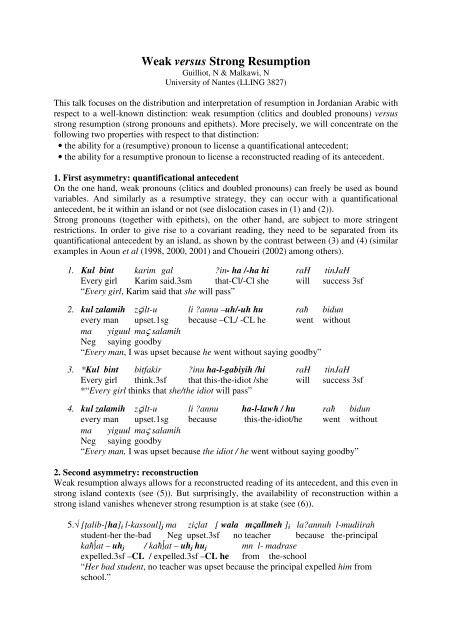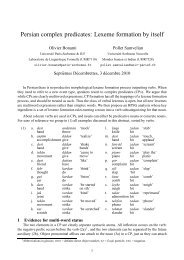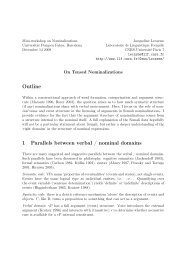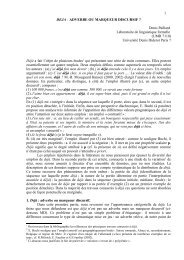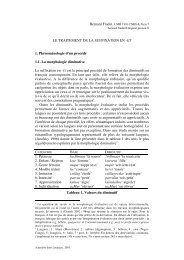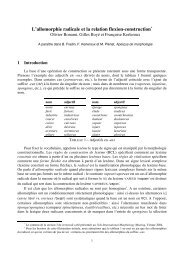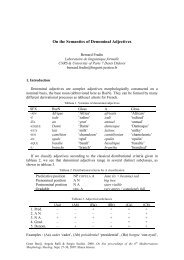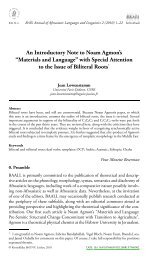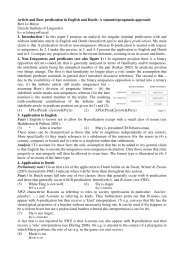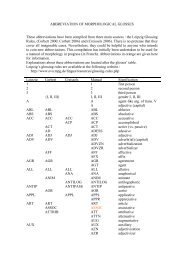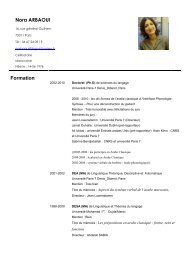Weak versus Strong Resumption
Weak versus Strong Resumption
Weak versus Strong Resumption
Create successful ePaper yourself
Turn your PDF publications into a flip-book with our unique Google optimized e-Paper software.
<strong>Weak</strong> <strong>versus</strong> <strong>Strong</strong> <strong>Resumption</strong><br />
Guilliot, N & Malkawi, N<br />
University of Nantes (LLING 3827)<br />
This talk focuses on the distribution and interpretation of resumption in Jordanian Arabic with<br />
respect to a well-known distinction: weak resumption (clitics and doubled pronouns) <strong>versus</strong><br />
strong resumption (strong pronouns and epithets). More precisely, we will concentrate on the<br />
following two properties with respect to that distinction:<br />
• the ability for a (resumptive) pronoun to license a quantificational antecedent;<br />
• the ability for a resumptive pronoun to license a reconstructed reading of its antecedent.<br />
1. First asymmetry: quantificational antecedent<br />
On the one hand, weak pronouns (clitics and doubled pronouns) can freely be used as bound<br />
variables. And similarly as a resumptive strategy, they can occur with a quantificational<br />
antecedent, be it within an island or not (see dislocation cases in (1) and (2)).<br />
<strong>Strong</strong> pronouns (together with epithets), on the other hand, are subject to more stringent<br />
restrictions. In order to give rise to a covariant reading, they need to be separated from its<br />
quantificational antecedent by an island, as shown by the contrast between (3) and (4) (similar<br />
examples in Aoun et al (1998, 2000, 2001) and Choueiri (2002) among others).<br />
1. Kul bint karim gal ?in- ha /-ha hi raH tinJaH<br />
Every girl Karim said.3sm that-Cl/-Cl she will success 3sf<br />
“Every girl, Karim said that she will pass”<br />
2. kul zalamih zςilt-u li ?annu –uh/-uh hu raħ bidun<br />
every man upset.1sg because –CL/ -CL he went without<br />
ma yiguul maς salamih<br />
Neg saying goodby<br />
“Every man, I was upset because he went without saying goodby”<br />
3. *Kul bint bitfakir ?inu ha-l-gabiyih /hi raH tinJaH<br />
Every girl think.3sf that this-the-idiot /she will success 3sf<br />
*“Every girl thinks that she/the idiot will pass”<br />
4. kul zalamih zςilt-u li ?annu ha-l-lawħ / hu raħ bidun<br />
every man upset.1sg because this-the-idiot/he went without<br />
ma yiguul maς salamih<br />
Neg saying goodby<br />
“Every man, I was upset because the idiot / he went without saying goodby”<br />
2. Second asymmetry: reconstruction<br />
<strong>Weak</strong> resumption always allows for a reconstructed reading of its antecedent, and this even in<br />
strong island contexts (see (5)). But surprisingly, the availability of reconstruction within a<br />
strong island vanishes whenever strong resumption is at stake (see (6)).<br />
5.√ [ţalib-[ha]i l-kassoul]j ma ziςlat [ wala mςallmeh ]i la?annuh l-mudiirah<br />
student-her the-bad Neg upset.3sf no teacher because the-principal<br />
kaħ∫at – uhj / kaħ∫at – uhj huj mn l- madrase<br />
expelled.3sf –CL / expelled.3sf –CL he from the-school<br />
“Her bad student, no teacher was upset because the principal expelled him from<br />
school.”
6. *[ţalib - [ha]i l-kassul]j ma ħakjan maς [QP wala mςalmih ]i<br />
student- her -the bad Neg talked,1pl with no teacher<br />
gabl ma huj /ha-l- ġabij yesal<br />
before he / the-idiot.3sm arrive.3sm<br />
“Heri bad studentj, we didn’t talk to any teacheri before hej / this idiotj arrived.”<br />
3. Our main goal:<br />
The main goal of the talk will be to propose an analysis that could relate these two<br />
asymmetries concerning the distinction between weak resumption (WR) and strong<br />
resumption (SR). More precisely, we will argue for the following:<br />
• Following Elbourne (2002) among others, a covariant/distributive reading of a pronoun<br />
arises either from a bound variable interpretation, or an e-type interpretation of that entity.<br />
• Partially following Noguchi (1997), functional items (i.e. weak pronouns) license a bound<br />
variable or an e-type interpretation whereas lexical ones (i.e. strong pronouns and epithets)<br />
can only get an e-type interpretation.<br />
We will show how such an approach to quantificational variability can account for a wide<br />
range of properties of weak, strong pronouns or epithets, and notably the following:<br />
• covariant reading of strong pronouns or epithets restricted to island contexts;<br />
• reconstruction available within strong islands with WR, but not with SR.<br />
References<br />
Aoun J. and Benmamoun E. (1998) Minimality, reconstruction, and PF movement. Linguistic<br />
Inquiry 29:569-597.<br />
Aoun J. and Choueiri L. (2000) Epithets. NaturalLanguage & Linguistic Theory 18:1-39.<br />
Aoun J., Choueiri L. and Hornstein N. (2001) <strong>Resumption</strong>, movement and derivational<br />
economy. Linguistic Inquiry 32:371-403.<br />
Choueiri, Lina (2002) Issues in the syntax of resumption: Restrictive relatives in Lebanese<br />
Arabic. PhD thesis, University of Southern California.<br />
Elbourne, Paul (2002) Situations and individuals. PhD thesis, MIT.<br />
Noguchi, Tohru (1997) Two types of pronouns and variable binding. Language 73-4:770-797.


